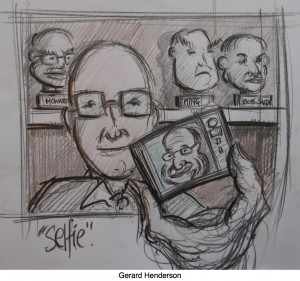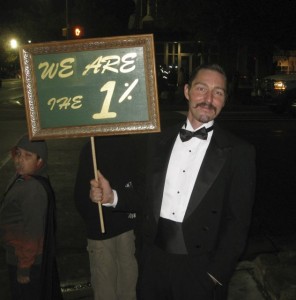by Quentin Cockburn
Gerard Henderson, The Australian and typical Radio National listener
In an attack on the artifice of left-leaning literary conferences, the ABC, and David Marr, Gerard Henderson concludes;
“Conferences where almost everyone agrees with almost everyone else are invariably boring. They also have the effect of distorting reality as the inner-city Left dismiss as bigoted the “they” who happen to live in suburban and regional Australia’.
He writes for the Australian, where, and I quote, “where almost everyone agrees with almost everyone else’. He and Marcia, Noel, and big Brother Rupert.
I’m worse. A Radio National listener. Henderson rails against ‘taxpayer funded literary festivals’. An anger felt that we the taxpayer were forking out and subsidising this left cabal. He must go apoplectic on the taxpayer funded return of $880 million to Rupert. On David Marr and Cardinal Pell, He fumed, ‘No other view was heard”. True Gerard. In short-hand code; they’re all dead.
 He’s quite right. Right wingers are not thinkers, they’re reactionary bastards. Full of hate and punishment.
He’s quite right. Right wingers are not thinkers, they’re reactionary bastards. Full of hate and punishment.
He loathes Marr. Funny, his loathing actually makes me like him. A collective of “right -minded’ people,? Southpark nailed it, “a smug”. Henderson points to Morrie Schwartz and his stable. Lefty protagonists and then lists them all, (like Schindler, he likes lists). He belabours the fact these leftist sympathisers, bleeding hearts, public subsidised neophytes, Burnside, Archer, Leunig, etc, talk amongst themselves, and the literary festivals are ‘like with like’!
Couldn’t agree with him more. I hate writers festivals. Writers festivals are what you get when the forum for public ideas have become utterly Murdocked!! We have writers festivals because few people can bother reading stuff that challenges them. I’m proof of this! Could only manage the first paragraph of Bob Carr’s biography. I grew up in the outer suburbs. I don’t want to think, and society in general can go get fucked!!
Who would pay to hear Andrew Bolt? Who would want to listen to Robert Manne? It’s bad enough enduring the sameness of the Monthly, without having to turn to the daily dross of the Herald scum and the Australian. Who wants local when you can global – Murdoch’s, sexualised purient filth. We as consumers want certainty, The divine, (now the Catholic Church is so diminished) entropy of slow birth over the open grave.
But I am a typical Radio National Listener. It’s a wide audience. It brooks a plurality of input. The right like to think of Radio National listeners as all the same. The same group think of Asians as amorphous. They deny them difference, because that would change their worldview; like global warming, finite resources and greed. It would endanger their sense of hyper paranoid insecurity. Boisterous nationalism, border protection, all xenophobia as Adolf will tell you is insecurity. Good thing we have Gerald at the Sydney Institute to temper this.
But though I listen I cannot condone, all of Radio National. What is that misquote from Descartes? Why then should I like Geraldine Doogue. Ron Casey should have landed her that left hook and left Normie alone. And ‘Life Matters’? To wallow in a soup of slushy, self indulgence. My nadir, Rachel Cohn, and ‘The Spirit of Things’. Oh! How I would like to crucify her. But I uphold their right to annoy me, to make me in mid stream, get up and turn the radio off. I hate the music programme, it’s so Sydno-centric. Though I confess an enduring love for Amanda Vanstone. All of this I prefer to the Orwellian certainty of the Murdoch; his banal, de-valuing Evil Empire,
That’s why we don’t have ‘righties’ at writers festivals because we already know what they will say. We already know that they are strong on punishment, coercion, fear and delusions of certainty. And we know that writers festivals talk ‘like with like’, but with 85% of Australia media owned by Morloc, where else can they disseminate thinking? It’s banned in Schools, Universities, and Parliament. Like Caxton’s original printing press, it is rarer by the minute, and exists beyond the odd Morrie only on the ethernet. That my dear friend is all we have. As a punishment I would test anyone to endure fully a writers festival. I imagine the audience to be almost as bad as an Art Gallery opening. More boring than Womad, or the collected musical works of Paul Kelly. The pompous pretentious, preening, smug, wankers, (just like myself). Occasionally though, in amongst their latte, machiattos, non lactose skinny, vegan organic machiolattos, fattened superannuation portfolios, and inflated self importance, an offering of truth falls out. From Murdoch, the offering is just the certainty of fear and punishment.




